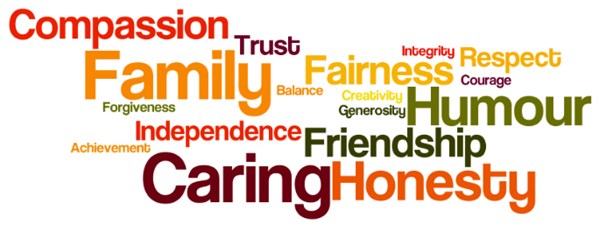Well-being and Values Education: Where do we go from here?
11 Oct 2017 | Laura Hyde

In response to the alarming increase in the number of young
people who experience mental health problems, educationalists,
psychologists, sociologists and the spiritually inclined have
rallied wholeheartedly to offer a number of remedies. Many of these
initiatives are serving well in responding to the effects of mental
ill-health.
As a school leader for twenty-three years I found myself in the
privileged position of having the opportunity to create the
circumstances in which young people could truly flourish, thereby
addressing some of these crucial issues. Although there were a good
number of failed attempts during my time, I would like to share
what I ultimately found to work well in transforming the level of
happiness in the lives of those who were in our care.
A vision of human
potential
It has always seemed to me that the efforts of any educational
leadership are rendered weak unless there is a strong vision in the
heart and mind of the Head or Principal.
In the absence of vision a leader is left rudderless and the
direction of travel is sadly dictated by whatever fashionable idea
happens to be blowing in the ever-changing winds of passing
ideologies. These ideologies are often politically driven or dreamt
up by those who have little contact with the real business of
nurturing human potential.
Only too often, heads adopt new initiatives without really
scrutinising how they will affect the overall direction of their
schools or indeed giving time to examine carefully whether the
ideas actually have any real merit in them from the point of view
of human welfare.
This is where a leader needs to have an educational 'rudder': do
these ideas or initiatives really serve the vision for human
development and potential? In the absence of a clear vision,
we become subject to the fear of standing out from the crowd, or of
not 'keeping up with the times'. I have sat through large meetings
where new ideologies have been promulgated as 'the thing to do
now'. Often ideas are accepted as though they were incontrovertible
axioms - and the audience nods to these axioms in a mental sleep as
though they were eternal 'truths'.
Historically, our great schools have always been inspired by a
large vision of human potential. A human being does have
extraordinary potential and is capable of unfathomable achievement,
physically, intellectually, creatively and spiritually.
Furthermore, it has always been understood that our development
depends almost entirely upon the quality of influences to which we
have been subjected in our formative years.
That is why our great schools' curricula were governed by the
profound principle that in order for the best to flow from a human
being it should be nourished with the best of all that has been
thought, spoken and created throughout the generations.
Moral and spiritual education:
filling a vacuum
We would probably all agree that the great qualities of a human
being - such as empathy, compassion, forgiveness, courage,
generosity, honesty, loyalty, endeavour, power of devotion - are to
be highly prized. Values education has sought to encourage the
development of such qualities and much admirable work has been done
in many schools.

However, if I were to have any misgivings on any of this it
would be to argue that often such education lacks two vital
elements: the first is content or substance; the
second is that it fails to establish deep roots within the
individual which would have the power to transform
behaviour - especially when tested in challenging
circumstances.
Content and
practice
During my twenty years of headship and three years as Director
of Education for a group of schools I have developed a
philosophical approach to values education which has proved to be
very effective in enabling these great qualities to flourish in
pupils as they grow through childhood, adolescence and into
responsible adulthood.
The course is entitled 'philosophy': it is not academic
philosophy but is based in the meaning of the word in that it seeks
to inspire a love of wisdom and its value in the practice of daily
life. Each of the virtues or qualities is taken in turn and a few
lessons are given to exploring the practical meaning of that
particular quality by reference to a selection of texts from a
variety of global wisdom traditions, past and present.
These texts are studied carefully together in conversation in
order to draw out the meaning from as many perspectives as
possible. Thereafter, the pupils are asked to practise what they
have understood in the lesson and share findings with each other
the following week. The effect of this process is to allow a good
period of assimilation through enquiry which may then be
consolidated and validated in practice.
Friendship is always a huge subject of concern for youngsters.
They desperately want good friendships and yearn for the comfort of
special friends. The trials and tribulations which young people
experience with regard to making, keeping and breaking friendships
consume a very large portion of their attention, let alone their
emotional energy.
Equally, we well know that enormous damage to relationships is
done through careless and harmful speech whether it is conveyed
through social media or face to face. Childhood and adolescence is
fertile ground for the use and abuse of speech in this respect. To
assist with this, one of the topics discussed in Year 7 (age 11-12)
is how to ensure that speech does not harm.
There is a quotation from Eknath Easwaran, (1910-1999), a Hindi
writer and philosopher, which I have found has a lasting impact on
young people well into their adulthood. Former pupils tell me that
of all the texts they have studied, this quotation has remained
very much alive in their daily experience. They report that it has
a transformative effect on the quality of their friendships:

Over time, it is very apparent that pupils' conduct and
happiness are enhanced through this experience. Furthermore, values
or virtues take root in the individual and become natural to their
way of life. Indeed, I have had a number of former pupils report on
how this philosophical content had served to give them welcome
clarity in the exercise of their personal judgement.
Young people have found that the combination of practical wisdom
and a variety of approaches to meditative practice throughout their
education has given them significant strength in meeting
challenging circumstances. Many have reported being able to
maintain well-being throughout university whilst observing sadly
that a number of their contemporaries were facing a range
of mental health problems. Very often these pupils would find
themselves providing comfort and strength for their peers.
In summary, a philosophical approach to values education
combined with an ability to access inner peace and live
'mindfully', serve beautifully to enhance the discovery of what it
really means to live well and to live happily.
Supporting Heads to develop a
whole-school ethos
I believe it is important for heads and leadership teams to have
access to appropriate coaching and mentoring to support them in
creating a school ethos which has the power to transform and
enhance the lives of their young people. The needs of each school
are different. In working closely with a head, it is possible to
discover his or her particular vision and make it real.
We can all speak the right words, but there is a big difference
between aspiration and authentic transformation; the challenges may
be great but solutions can be found.

Laura
Hyde (Cert Ed, MEd) is a Consultant in Educational
Development. She offers coaching or mentoring to heads and
their leadership teams to help them discover the means to deliver a
really effective school ethos.